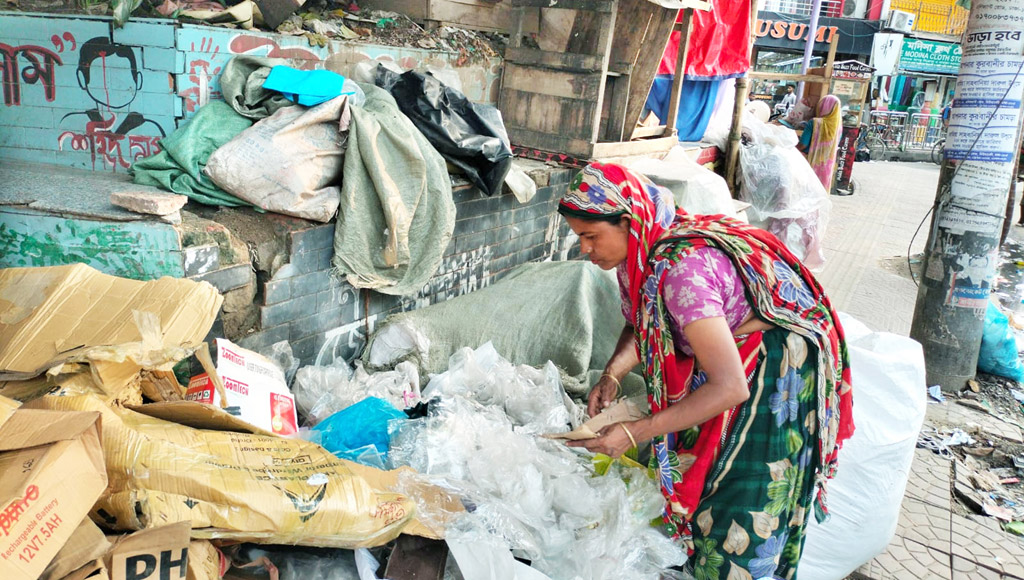WASTE TO WORTH: Women waste pickers and circular economy
by Shajeda Akter Moni [Source: New age, 21 June 2025]

EVERY morning, 45-year-old Julekha Khatun (name changed) begins her day before sunrise, rummaging through garbage heaps at Rayerbazar. She collects plastic bottles, bits of metal and paper. These are items most of us thoughtlessly throw away. To her, they are lifelines. ‘I pick waste to feed my children,’ she says, with her bruised, calloused hands giving the proof of her toil. Julekha is among 15,000–20,000 female waste pickers who informally work across Dhaka.
Dhaka produces about 6,000 tonnes of daily waste and only 40–50 per cent is collected legally and taken for disposal. The remaining is handled informally, mostly by waste pickers. The women who are in this business toil in risky conditions, without gloves, contracts, medical attention or recognition. Yet, they are the hidden driving force of the informal circular economy, rescuing, sorting and diverting waste back into the recycling stream.
In spite of their critical role, women waste pickers earn only Tk 150–250 a day, far less than the set minimum wage. The majority reside in urban slums such as Karail and Hazaribagh, where they endure substandard housing, scorching heat and hunger. Typically, their children accompany them to the dumps, where they inhale poisonous fumes while sorting out plastic materials. ‘This is not the work we chose,’ Rina (name changed), 32, says. ‘It’s survival.’
Bangladesh is reputed for its circular economy model, with a special mention of plastic recycling. More than 51 per cewnt of plastic waste is recycled, one of the highest percentages in South Asia. However, the otherwise unsung heroes of this process, the women waste pickers, are systematically denied decision-making, benefits and social protection. Although they work towards sustainability, they receive very little dignity in exchange.
A 2020 practical action survey found that 92 per cent of the waste pickers in Dhaka experience gender-based violence or harassment while working — in the street, at dumps, or from scrap dealers. With no formal contracts or union protection, their rights are routinely exploited. But, they continue with the work as there are limited options for uneducated, rural-to-urban migrant women.
With economic destitution comes exposure to health hazards for these women. Prolonged exposure to medical waste, metal fragments and toxic chemicals results in infection, respiratory disease and long-term skin diseases. A 2022 BRAC health survey says that 61 per cent of women waste pickers suffered from untreated wounds and 49 per cent regular breathing problems. None has access to clinic facilities and none has occupational health coverage.
But they do not simply endure. They innovate, organise and adjust. In Sattala slums, women have organised waste-sorting cooperatives. They sort plastic, glass and metal to increase resale value. The self-help models show what women can do, if given tools and visibility.
Dhaka’s north and south city authorities have initiated pilot programmes to formalise informal waste workers; yet, inclusion is not comprehensive. A mere one in every 10 women waste pickers has been enrolled under any municipal initiative. Lacking formal identity or occupational status, they have no access to personal protective equipment, medical facilities or even emergency services during crises such as the Covid outbreak or heatwaves.
The climate crisis is making their life more difficult. The urban temperature rise because of the urban heat island phenomenon, and dumps are 5°C warmer than the rest of the urban area. The women work in direct sunlight, surrounded by rotting organic trash and dehydrated. Shaded resting spots, cooling centres, or water points, however, are not available for informal workers.
Julekha remembers having fainted in the April 2023 heatwave. “I felt dizzy but didn’t stop. I had to work that day,’ she says. No physician, no shade—just more garbage to gather. Her story is those of thousands. Where gender poverty meets climate exposure, women’s bodies are the frontline battle zone; and, nobody is counting the dead.
There are policy guidelines such as the National 3R Strategy (reduce, reuse, recycle) that do not include gender-specific stipulations or the safeguarding of informal waste workers. There are international examples such as Brazil’s integration of waste picker cooperatives into municipal contracts that provide a template for Bangladesh. But adaptation at the local level needs will and social compassion.
Women waste pickers, if formalised and trained, would be ideal agents for climate-smart waste management. Formalisation can make recycling more efficient by 25 per cent and create thousands of green jobs, according to a 2021 UN Habitat report. Women already possess the skills. All they need is support, security and status.
We must stop depicting these women as scavengers. They are environmental workers, every day working towards climate goals, resource recovery and urban sanitation. With right policies, they can go from waste to worth, from the margin to the mainstream. Including them is not charity. It is a sustainable investment.
As Dhaka imagines a cleaner, greener tomorrow, it cannot achieve that by walking over the backs of the people who clean it. Let us rewrite the narrative — from the dumps to the decision table. Let us make room in our climate plans, city budgets and social conscience for the women who pick up what we throw away. Their narrative is not trash. It is change.
Major Shajeda Akter Moni, an officer of the Bangladesh army, works as deputy director at the Research Centre, Bangladesh University of Professionals.